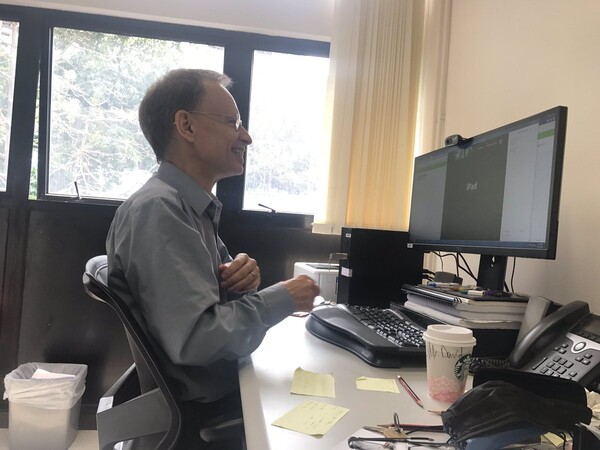The Unrealised Potential of Feedback
Feedback can often seem like a one-way communication between the teacher, who provides comments and evaluation of a student’s work, and the student, who passively receives that information. Professor David Carless, in the Academic Unit of Social Contexts and Policies of Education at the Faculty of Education, HKU, is trying to shake us out of that rut.
Professor Carless is a pioneer in feedback literacy, particularly at the tertiary level. Over the past 15 years, he has published a number of research papers analysing feedback in the university setting and proposing new theoretical and practical approaches. His efforts recently earned him a Humanities and Social Sciences Prestigious Fellowship (HSSPF) from the University Grants Council to further his research and a Teaching Development Grant (TDG) to consider how to apply his findings at HKU.
“The traditional view of feedback is that of the teacher giving information about a student’s strengths and weaknesses and how he/she can improve. That’s a reasonable view, but I feel it’s limited in the way that it doesn’t recognise students’ agency and self-reflection,” Professor Carless said.
“Another way to think of feedback is its potential for spurring action. Feedback needs to make sense to the recipient, not just to the person commenting, so the recipient can think about how to progress. It’s a kind of social interaction in which the recipient’s needs, preferences and feelings should be considered.
“You can think of it in terms of daily life. If you’re trying to give feedback to your spouse or teenage kids and you lecture them, telling them what they need to do, they’re probably not going to like it very much. So feedback can be complex and emotional, and not easy to give or receive.”
Professor Carless has been investigating how to make feedback more effective to reinforce learning. One of the key factors he has found through observational research and interviews with teachers and students is that it largely depends on how teachers structure assessment – for example, whether they wait until the end of the course to provide feedback or they have sequences with feedback built in at different stages.
“If it is all end-loaded in a traditional examination at the end of the year, by the time the students receive their grade or other feedback, there is not much they can do with it. The course is finished, and the students will not be very motivated to move forward with that feedback,” he said.
“However, if there are different tasks before the final examination and with feedback at the end of each, there is some potential for students to build on previous inputs to improve their work in the next task. One of the things students say they most value is receiving feedback that they can act upon before a final grade is awarded,” Professor Carless said.
Teachers can also set up activities so students can understand the nature of quality work and reflect on that through peer feedback and self-evaluation.
“Sometimes, students don’t appreciate the value of peer feedback – they think the teacher is more important. It is quite unlikely that your classmates will give you a brilliant insight, but one of the values of peer feedback is in seeing how other people approach the same task and internally generating some insights from this,” Professor Carless said.
“Teachers can set the scene for peer feedback by talking about their own experiences in academia and how we submit to journals, get peer reviewed and sometimes find that review useful and sometimes annoying. This creates a culture where peer feedback is seen as a normal part of improving your work,” he said.
Professor Carless added that emotional responses to feedback are part of the process, both for teachers and students. Teachers may feel they have been spending a lot of time giving commentary and other feedback, but it is not satisfying if students do not reciprocate. Students, for their part, need to take an active role in the process and manage their responses to feedback so they can move forward in improving their work.
Professor Carless has also been looking at feedback in practice during the COVID-19 pandemic. He recently interviewed six recipients of the Teaching Excellence Awards from HKU to deepen his understanding of their feedback techniques and the extent to which these were impacted by the pandemic.
While the teachers were from different disciplines and their feedback approaches varied, their feedback practices seemed to stand up to the pandemic challenges. A teacher in the Faculty of Science, for instance, had already developed a system of online quizzes and automated feedback, so students could continue to deepen their knowledge outside the classroom during lockdowns. A teacher in the Faculty of Law found the pandemic restrictions even somewhat beneficial. She usually gave students in-person feedback after a subject’s semester 1 examination to set them up for a continued study of the subject in semester 2. When the feedback sessions were forced online, she found that shy students were more willing to ask questions using the chat function than they had been in person.
Professor Carless said the HSSPF will give him time to complete the project related to feedback practices during the pandemic and other ongoing projects, while the TDG has enabled him to collaborate with six other teachers in the Faculty to develop concrete examples of effective feedback practice and a framework for teachers to adopt these approaches.
“There is currently a disjuncture between the thinking of feedback theorists and the teachers at the chalkface who haven’t really studied feedback literacy much,” Professor Carless said, “Everyone can benefit from feedback literacy because it is about our ability to interact, build relationships and negotiate with each other. I hope to transform the conception of feedback so that it can be seen as encouraging, critical and supportive.”
Professor David Carless has pioneered work in feedback literacy, investigating how to make feedback more effective to reinforce learning.

Professor Carless enjoys his online teaching and has found that feedback practices seem to stand up to the pandemic challenge.



